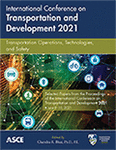A Dynamic Traffic Assignment Approach to Evaluating Incident-Induced User Delay Costs with Integrated Corridor Management: A Case Study in Austin, Texas
Publication: International Conference on Transportation and Development 2021
ABSTRACT
Traffic incidents often require lane or road closures to facilitate the incident clearance and ensure the safety of first responders. With the integrated corridor management (ICM) strategies, upstream traffic could be diverted to parallel roadways and the incident-induced traffic congestion is managed in an integrated system rather than individual facilities. This study delivers an example of estimating the incident-induced user delay costs with ICM strategies. A dynamic traffic assignment (DTA) tool is used to quantify the travel delays caused by an incident under various ICM strategies. In particular, a case study based on a fatal crash on the Interstate 35 in Austin, Texas, is performed under three types of ICM strategies. The DTA can capture more realistic traffic flow characteristics by considering time-dependent link information, compared to the static traffic assignment (STA) method. DTA parameters are specified to approximate the driver behavior under different ICM strategies. Emerging traffic data were collected to validate the study results. All tested ICM strategies are found to be associated with decreased travel times and user delay costs, but the one that offers both timely detour options and proper adjustments to traffic controls on parallel roads can be more effective in reducing corridor-wide delays. This study contributes by demonstrating the implementation of DTA models to model driver behavior during traffic incidents and the deployment of ICM strategies. DTA models are a valuable tool to evaluate the region-wide effectiveness of traffic management strategies during traffic incidents.
Get full access to this article
View all available purchase options and get full access to this chapter.
REFERENCES
Chu, L., Liu, H. X., and Recker, W. (2004). Using microscopic simulation to evaluate potential intelligent transportation system strategies under nonrecurrent congestion. Transportation Research Record, 1886(1), 76-84.
Florian, M., Mahut, M., and Tremblay, N. (2008). Application of a simulation-based dynamic traffic assignment model. European journal of operational research, 189(3), 1381-1392.
Guin, A., Porter, C., Smith, B., and Holmes, C. (2007). Benefits analysis for incident management program integrated with intelligent transportation systems operations: Case study. Transportation Research Record, 2000(1), 78-87.
Levin, M. W., Pool, M., Owens, T., Juri, N. R., and Waller, S. T. (2015). Improving the convergence of simulation-based dynamic traffic assignment methodologies. Networks and Spatial Economics, 15(3), 655-676.
Lindley, J. A. (1986). Quantification of urban freeway congestion and analysis of remedial measures.
Lindley, J. A. (1987). Urban freeway congestion: quantification of the problem and effectiveness of potential solutions. ITE journal, 57(1), 27-32.
Liu, Y., Li, P., Wehner, K., and Yu, J. (2013). A generalized integrated corridor diversion control model for freeway incident management. Computer-Aided Civil and Infrastructure Engineering, 28(8), 604-620.
Mahmassani, H. S., and Peeta, S. (1993). Network performance under system optimal and user equilibrium dynamic assignments: implications for ATIS. Transportation Research Board.
Mahmassani, H. S. (2001). Dynamic network traffic assignment and simulation methodology for advanced system management applications. Networks and spatial economics, 1(3-4), 267-292.
National Highway Traffic Safety Administration. (2017). Fatal motor vehicle crashes: overview. Washington, DC: US Department of Transportation.
Shelton, J., Chiu, Y. C., and Samant, S. (2009). Modeling for flexibility and consistency: an integration capability for mesoscopic data and microscopic traffic simulation models. Texas Transportation Institute., 1-18.
Wang, C., Quddus, M. A., and Ison, S. G. (2009). Impact of traffic congestion on road accidents: A spatial analysis of the M25 motorway in England. Accident Analysis & Prevention, 41(4), 798-808.
Zhou, X., Mahmassani, H. S., and Zhang, K. (2008). Dynamic micro-assignment modeling approach for integrated multimodal urban corridor management. Transportation Research Part C: Emerging Technologies, 16(2), 167-186.
Information & Authors
Information
Published In
Copyright
© 2021 American Society of Civil Engineers.
History
Published online: Jun 4, 2021
Authors
Metrics & Citations
Metrics
Citations
Download citation
If you have the appropriate software installed, you can download article citation data to the citation manager of your choice. Simply select your manager software from the list below and click Download.
